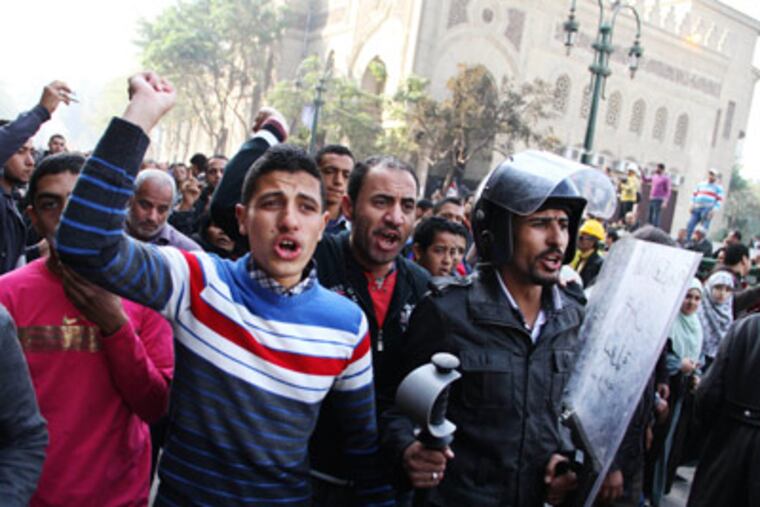Egyptian military defends crackdown on protesters
CAIRO - The Egyptian military on Monday defended its harsh crackdown on protesters, saying soldiers were trying to protect government buildings. And it accused private news organizations of colluding with those it says are attacking government property.

CAIRO - The Egyptian military on Monday defended its harsh crackdown on protesters, saying soldiers were trying to protect government buildings. And it accused private news organizations of colluding with those it says are attacking government property.
"There is systematic cooperation against the armed forces," said Adel Emara, a member of the ruling military council. "Every protest starts peacefully and then turns into an attack on government facilities."
The council's comments further angered protesters on a fourth straight day of bloody clashes that health officials said Monday had killed 12 people and injured hundreds. The violence is some of the worst to convulse Cairo since the January uprising that forced the resignation of President Hosni Mubarak, installing the military as caretaker rulers, and it has raised fears that the first post-Mubarak elections last month will not calm protesters' anger.
Islamist parties were leading the second phase of parliamentary elections, Egyptian election officials reported as the ballot-counting from last week's vote continued. As in the first round, the Muslim Brotherhood's Freedom and Justice Party captured the most seats, followed by the more conservative Salafist Nour party.
The Muslim Brotherhood issued a statement condemning the attacks on government property, a sign that Islamist leaders were trying to cement their relationship with Egypt's powerful military. "Joining the protests will only worsen the situation," said a separate statement by an unnamed Muslim Brotherhood official. "There will be more bloodshed if we participate in such a violent situation."
The council's comments were the first since the clashes erupted Friday, and since images of a female protester being dragged, stripped, and brutally beaten by soldiers have been broadcast around the world, a shocking episode of violence in socially conservative Egypt. However, Emara denied reports that soldiers were using live rounds against demonstrators, including some who reportedly had died of gunshot wounds.
Asked about the female protester, Emara appeared to acknowledge the use of excessive force in that case and said: "I feel sorry for this as an Egyptian and a father," but he sought to place the blame on protesters and their backers.
He said the military council had received information of a plot to set fire to the parliament building, and he accused news organizations of withholding information about a fire at a science library.
Dozens of newly elected members of parliament, joined by other political and community leaders, filed suit against the interior minister, Gen. Mohamed Ibrahim, and the head of the Central Military Command, Gen. Hassan al-Roweini, accusing both of killing protesters. A statement by the group demanded that the council transfer power to parliament after the last round of elections and start the process for a presidential vote.